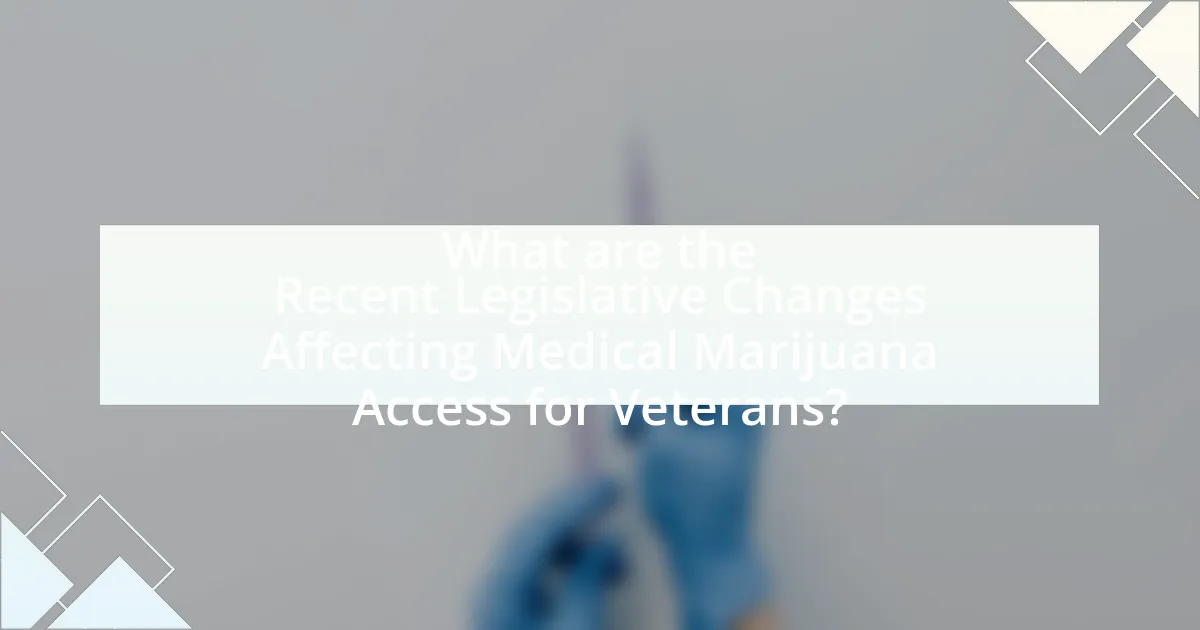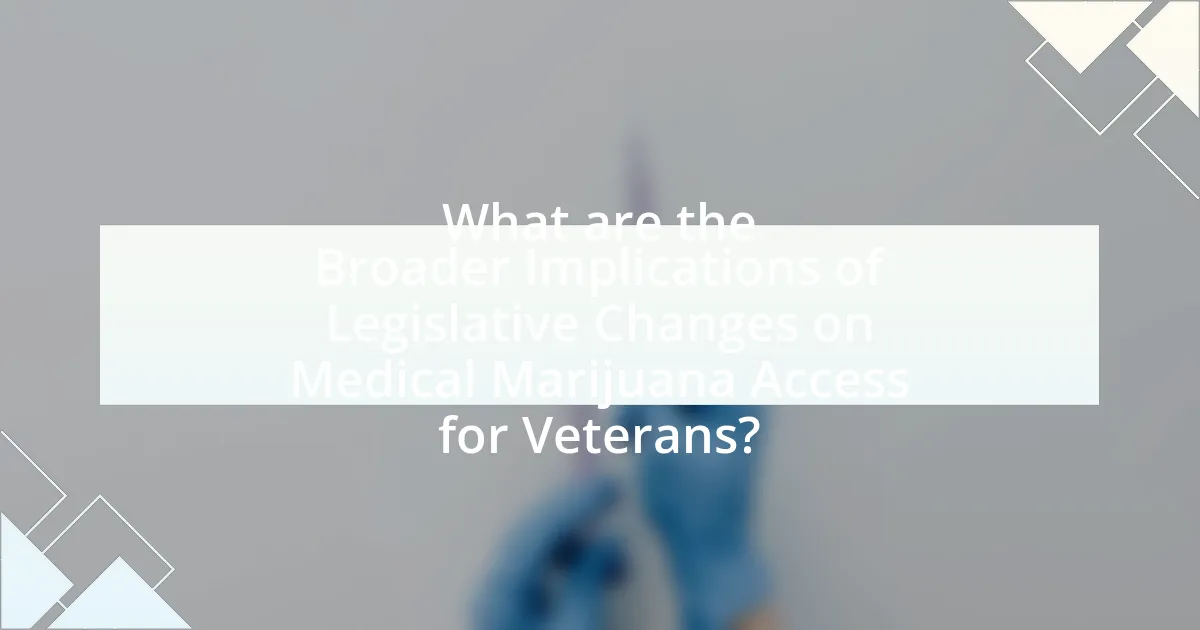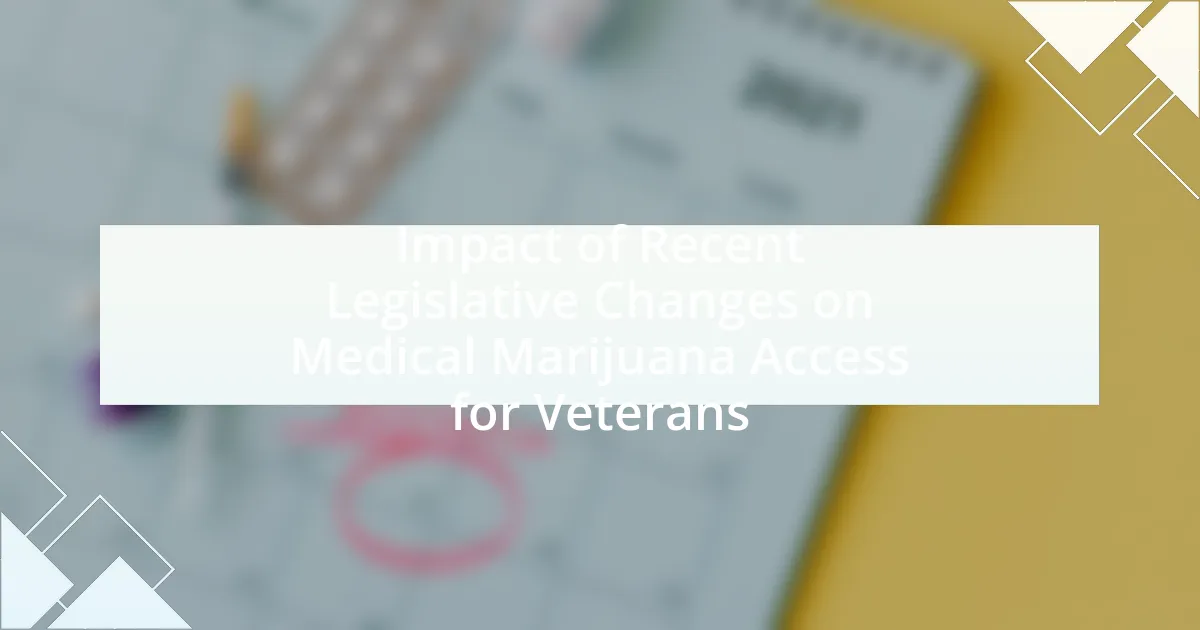The article focuses on the impact of recent legislative changes on medical marijuana access for veterans, highlighting key developments such as the Veterans Medical Marijuana Safe Harbor Act and the 2023 bill aimed at facilitating research on medical marijuana’s efficacy for treating conditions like PTSD and chronic pain. It details how these changes have been implemented by the Department of Veterans Affairs, expanding eligibility and streamlining the application process for veterans. The article also addresses the motivations behind these legislative reforms, the importance of medical marijuana access for veterans, and the evidence supporting its therapeutic benefits. Additionally, it discusses the remaining challenges veterans face in accessing medical marijuana and the broader implications of these legislative changes on veteran healthcare and mental health services.

What are the Recent Legislative Changes Affecting Medical Marijuana Access for Veterans?
Recent legislative changes have expanded medical marijuana access for veterans, particularly through the introduction of the Veterans Medical Marijuana Safe Harbor Act. This act allows veterans to use medical marijuana without fear of losing their benefits or facing legal repercussions. Additionally, the U.S. House of Representatives passed a bill in 2023 that aims to facilitate research on medical marijuana’s efficacy for treating conditions common among veterans, such as PTSD and chronic pain. These changes reflect a growing recognition of the potential therapeutic benefits of medical marijuana for veterans, addressing both legal and health-related barriers they previously faced.
How have these legislative changes been implemented?
The legislative changes regarding medical marijuana access for veterans have been implemented through the establishment of new policies and guidelines by the Department of Veterans Affairs (VA). These policies facilitate the prescription and use of medical marijuana for veterans in states where it is legal, allowing healthcare providers within the VA system to discuss and recommend medical marijuana as a treatment option. Additionally, the implementation includes training for VA staff on the legal and medical aspects of medical marijuana, ensuring that veterans receive informed care. This approach aligns with the growing recognition of medical marijuana’s potential benefits for conditions commonly experienced by veterans, such as PTSD and chronic pain.
What specific laws have been enacted regarding medical marijuana for veterans?
The specific laws enacted regarding medical marijuana for veterans include the Veterans Medical Marijuana Safe Harbor Act and provisions within the 2018 Farm Bill. The Veterans Medical Marijuana Safe Harbor Act aims to protect veterans from losing their benefits if they use medical marijuana in states where it is legal. The 2018 Farm Bill legalized hemp-derived CBD, which can be beneficial for veterans seeking alternative treatments. These laws reflect a growing recognition of the need for alternative therapies for veterans dealing with conditions like PTSD and chronic pain.
How do these laws differ from previous regulations?
The recent laws regarding medical marijuana access for veterans differ from previous regulations by expanding eligibility criteria and streamlining the application process. Previously, regulations often limited access to specific medical conditions and required extensive documentation, which created barriers for veterans seeking treatment. The new laws now allow a broader range of conditions to qualify for medical marijuana use and simplify the approval process, enabling faster access to necessary care. For instance, the Veterans Affairs Department has started to recognize additional mental health conditions, such as PTSD, as qualifying for medical marijuana, reflecting a shift towards more inclusive healthcare practices for veterans.
What are the motivations behind these legislative changes?
The motivations behind these legislative changes include improving veterans’ access to medical marijuana for therapeutic purposes, addressing the mental health crisis among veterans, and reducing reliance on opioids. Legislative bodies recognize that many veterans suffer from conditions such as PTSD and chronic pain, which can be alleviated through medical marijuana use. For instance, studies have shown that states with medical marijuana laws report lower opioid prescription rates, indicating a potential shift towards safer pain management alternatives. Additionally, these changes aim to align federal policies with evolving public opinion favoring medical marijuana, as evidenced by numerous polls indicating broad support for its use among veterans.
Why is medical marijuana access important for veterans?
Medical marijuana access is important for veterans because it provides an alternative treatment option for conditions such as PTSD, chronic pain, and anxiety, which are prevalent among this population. Research indicates that veterans experience higher rates of these conditions compared to the general population, with studies showing that approximately 20% of veterans suffer from PTSD. Furthermore, a 2019 study published in the Journal of Psychoactive Drugs found that veterans using medical marijuana reported a significant reduction in symptoms related to PTSD and chronic pain. Access to medical marijuana can enhance the quality of life for veterans by offering relief from debilitating symptoms and reducing reliance on opioids, which are often prescribed for pain management and carry a risk of addiction.
What evidence supports the use of medical marijuana for veterans’ health issues?
Evidence supporting the use of medical marijuana for veterans’ health issues includes studies indicating its effectiveness in alleviating symptoms of PTSD, chronic pain, and anxiety. For instance, a 2019 study published in the Journal of Psychoactive Drugs found that veterans using medical cannabis reported a significant reduction in PTSD symptoms, with 75% of participants experiencing improvement. Additionally, research from the University of California, San Diego, demonstrated that veterans using cannabis for chronic pain reported a 64% reduction in opioid use, highlighting its potential as an alternative treatment. These findings underscore the therapeutic benefits of medical marijuana for veterans facing various health challenges.
How do Recent Legislative Changes Impact Veterans’ Access to Medical Marijuana?
Recent legislative changes have expanded veterans’ access to medical marijuana by allowing more states to implement medical cannabis programs and by easing restrictions at the federal level. For instance, the Veterans Health Administration has updated its policies to support veterans who seek medical marijuana as a treatment option, acknowledging its potential benefits for conditions like PTSD and chronic pain. Additionally, the passage of laws such as the SAFE Banking Act has facilitated financial transactions for cannabis businesses, indirectly improving access for veterans by ensuring that dispensaries can operate more freely. These changes reflect a growing recognition of the therapeutic potential of medical marijuana for veterans, aligning with public opinion that increasingly favors cannabis use for medical purposes.
What barriers to access have been addressed by these changes?
Recent legislative changes have addressed barriers to access for veterans seeking medical marijuana by eliminating restrictions that previously limited their eligibility. These changes have allowed veterans to obtain medical marijuana recommendations without the fear of losing their benefits or facing legal repercussions. For instance, the Veterans Affairs Department has clarified that it will not penalize veterans for using medical marijuana in states where it is legal, thereby reducing the stigma and fear associated with seeking treatment. Additionally, the expansion of state-level medical marijuana programs has increased the availability of dispensaries and resources specifically tailored for veterans, further enhancing their access to necessary treatments.
How do these changes improve the application process for veterans?
The recent legislative changes streamline the application process for veterans seeking medical marijuana access by reducing bureaucratic hurdles and simplifying documentation requirements. These modifications allow veterans to more easily navigate the application system, ensuring quicker access to necessary treatments. For instance, the elimination of certain pre-approval steps and the introduction of online application options have significantly decreased processing times, enabling veterans to receive their medical marijuana prescriptions in a more timely manner.
What challenges still remain for veterans seeking access?
Veterans seeking access to medical marijuana face several challenges, including bureaucratic hurdles, lack of comprehensive state-level regulations, and stigma surrounding cannabis use. Bureaucratic hurdles arise from complex application processes and varying eligibility criteria across states, which can lead to confusion and delays in access. Additionally, many states do not have clear regulations that specifically address veterans’ needs, resulting in inconsistent access to medical marijuana. Stigma remains a significant barrier, as some veterans may fear judgment or repercussions from peers or healthcare providers for using cannabis as a treatment option. These challenges hinder veterans’ ability to obtain the medical marijuana they may need for conditions such as PTSD or chronic pain.
How do these changes affect the perception of medical marijuana among veterans?
Recent legislative changes have positively influenced the perception of medical marijuana among veterans. These changes, which include increased access and recognition of medical marijuana as a viable treatment option for conditions like PTSD and chronic pain, have led to a growing acceptance among veterans. A survey conducted by the American Legion in 2020 found that 22% of veterans reported using cannabis for medicinal purposes, reflecting a shift in attitudes as legal barriers diminish. Furthermore, as more states legalize medical marijuana, veterans are increasingly viewing it as a legitimate alternative to traditional pharmaceuticals, which often come with significant side effects.
What role does stigma play in veterans’ willingness to use medical marijuana?
Stigma significantly impacts veterans’ willingness to use medical marijuana, often leading to reluctance or refusal to seek treatment. Many veterans associate marijuana use with negative stereotypes, such as being perceived as irresponsible or unprofessional, which can deter them from considering it as a legitimate medical option. Research indicates that approximately 70% of veterans express concerns about the stigma surrounding cannabis use, fearing judgment from peers and healthcare providers. This stigma can create barriers to accessing medical marijuana, even in states where it is legally available for therapeutic purposes.
How can education and outreach improve veterans’ access to medical marijuana?
Education and outreach can significantly improve veterans’ access to medical marijuana by providing essential information about its benefits, legal status, and application processes. By educating veterans on the therapeutic uses of medical marijuana, outreach programs can help dispel myths and reduce stigma associated with its use, leading to increased acceptance and willingness to explore this treatment option. Furthermore, targeted outreach initiatives can inform veterans about state-specific laws and regulations, ensuring they understand their rights and the steps necessary to obtain medical marijuana legally. For instance, a study by the National Academies of Sciences, Engineering, and Medicine found that education on medical marijuana can enhance patient knowledge and promote informed decision-making regarding its use for conditions like PTSD and chronic pain, which are prevalent among veterans.

What are the Broader Implications of Legislative Changes on Medical Marijuana Access for Veterans?
Legislative changes regarding medical marijuana access for veterans can significantly enhance treatment options and improve quality of life for this population. These changes may lead to increased availability of medical marijuana, allowing veterans to manage conditions such as PTSD, chronic pain, and anxiety more effectively. For instance, a study published in the Journal of Psychoactive Drugs found that veterans using medical marijuana reported reduced symptoms of PTSD and improved overall well-being. Furthermore, easing restrictions can facilitate research into the therapeutic benefits of cannabis, potentially leading to more comprehensive treatment protocols tailored for veterans. Overall, legislative reforms can create a more supportive healthcare environment for veterans seeking alternative therapies.
How do these changes influence the overall healthcare system for veterans?
Recent legislative changes regarding medical marijuana access significantly influence the overall healthcare system for veterans by expanding treatment options for conditions such as PTSD and chronic pain. These changes allow veterans to utilize medical marijuana legally, which can lead to reduced reliance on opioids and other pharmaceuticals, addressing the opioid crisis that has disproportionately affected this population. According to a study published in the Journal of Psychoactive Drugs, veterans using medical marijuana reported a 64% reduction in opioid use, highlighting the potential for improved health outcomes and decreased healthcare costs associated with opioid prescriptions. Thus, these legislative changes not only enhance the quality of care for veterans but also promote a more holistic approach to their healthcare needs.
What impact do these changes have on veteran mental health services?
The recent legislative changes regarding medical marijuana access for veterans significantly enhance mental health services for this population. These changes allow veterans to utilize medical marijuana as a treatment option for conditions such as PTSD and chronic pain, which are prevalent among them. Research indicates that states with medical marijuana laws report a decrease in opioid prescriptions among veterans, suggesting an alternative approach to pain management that may reduce dependency on more harmful substances. Furthermore, studies have shown that cannabis can alleviate symptoms of anxiety and depression, thereby improving overall mental health outcomes for veterans.
How might these changes affect funding and resources for veteran healthcare?
Recent legislative changes regarding medical marijuana access for veterans may lead to increased funding and resources for veteran healthcare. These changes could prompt the Department of Veterans Affairs to allocate more financial resources towards research and treatment options involving medical marijuana, as evidenced by the growing recognition of its potential benefits for conditions like PTSD and chronic pain. Additionally, as more states legalize medical marijuana, federal funding may be redirected to support programs that educate veterans about its use and integrate it into their healthcare plans, thereby enhancing overall healthcare access and quality for veterans.
What lessons can be learned from these legislative changes?
The lessons learned from recent legislative changes regarding medical marijuana access for veterans include the importance of addressing barriers to care and the need for comprehensive policy frameworks. These changes highlight that easing restrictions can significantly improve access to alternative treatments for veterans suffering from conditions such as PTSD and chronic pain. For instance, states that have implemented more inclusive medical marijuana laws have reported increased patient enrollment among veterans, demonstrating a direct correlation between legislative action and improved health outcomes. Additionally, these changes underscore the necessity for ongoing research and data collection to inform future policies, ensuring that veterans receive the most effective and accessible care possible.
How can other states or countries model their legislation after these changes?
Other states or countries can model their legislation after recent changes in medical marijuana access for veterans by adopting similar frameworks that prioritize veteran needs and streamline access to medical marijuana. For instance, legislation can include provisions that simplify the application process for veterans, such as reducing bureaucratic hurdles and establishing dedicated resources for veteran support. Additionally, states can implement educational programs that inform veterans about the benefits and uses of medical marijuana, as seen in states like California, where veterans have reported improved quality of life through access to medical cannabis. By analyzing successful case studies and incorporating feedback from veteran communities, other jurisdictions can create tailored legislation that effectively addresses the unique challenges faced by veterans seeking medical marijuana.
What best practices can be identified for future legislative efforts regarding medical marijuana?
Best practices for future legislative efforts regarding medical marijuana include establishing clear regulatory frameworks, ensuring patient access, and incorporating evidence-based research. Clear regulatory frameworks help define the legal status and guidelines for medical marijuana use, which can reduce confusion and enhance compliance. Ensuring patient access involves creating streamlined processes for obtaining medical marijuana prescriptions, which is crucial for veterans who may face barriers in accessing care. Incorporating evidence-based research ensures that legislation is informed by scientific data, which can improve patient outcomes and support the legitimacy of medical marijuana as a treatment option. For instance, studies have shown that medical marijuana can alleviate chronic pain and PTSD symptoms, conditions prevalent among veterans, thus reinforcing the need for informed legislative practices.
What practical steps can veterans take to navigate the new medical marijuana landscape?
Veterans can navigate the new medical marijuana landscape by first consulting with a healthcare provider knowledgeable about medical cannabis. This step is crucial as it ensures that veterans receive tailored advice based on their medical history and specific needs. Next, veterans should familiarize themselves with state laws regarding medical marijuana, as regulations vary significantly across states. Understanding these laws will help veterans determine eligibility and the legal process for obtaining medical marijuana.
Additionally, veterans can seek support from organizations dedicated to veterans’ health and cannabis advocacy, such as the Veterans Cannabis Project, which provides resources and guidance. Engaging with local dispensaries that cater to medical patients can also provide valuable information on product options and usage. Finally, veterans should keep abreast of ongoing legislative changes, as these can impact access and regulations surrounding medical marijuana.
How can veterans find reliable information about their rights and access?
Veterans can find reliable information about their rights and access by consulting official resources such as the U.S. Department of Veterans Affairs (VA) website, which provides comprehensive details on veterans’ benefits and legal rights. The VA offers specific sections dedicated to medical marijuana policies and state laws, ensuring that veterans are informed about their options and protections. Additionally, organizations like the Veterans of Foreign Wars (VFW) and the American Legion provide advocacy and resources that help veterans navigate their rights related to medical marijuana access. These organizations often publish guides and host informational sessions to educate veterans on recent legislative changes affecting their access to medical marijuana.
What resources are available to assist veterans in obtaining medical marijuana?
Veterans can access several resources to assist in obtaining medical marijuana, including the Veterans Affairs (VA) healthcare system, state medical marijuana programs, and veteran advocacy organizations. The VA does not prescribe medical marijuana but provides guidance on state laws and can refer veterans to state programs where they can apply for medical marijuana cards. Additionally, organizations like the National Organization for the Reform of Marijuana Laws (NORML) and the Veterans Cannabis Project offer information and support to veterans navigating the medical marijuana process. These resources are crucial as recent legislative changes have expanded access to medical marijuana for veterans in many states, reflecting a growing recognition of its potential benefits for conditions such as PTSD and chronic pain.

Leave a Reply